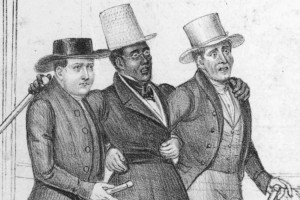A History of the Newly Resurgent ‘Black National Anthem’
Photo: Jon Batiste leads a protest March in Manhattan in June 2020, where he and his band performed “Lift Every Voice and Sing.” (Ira L. Black/Corbis via Getty Images)
(Time Magazine) When the National Football League kicks off its season on Sept. 10, it will do so with a song that is unknown to some Americans and essential to others. “Lift Every Voice and Sing,” otherwise known as the Black national anthem, was introduced to many by Beyoncé when she sang it at Coachella two years ago. But the song has long been a pillar of Black culture and life, sung at church ceremonies, political protests, school graduations and family gatherings. “Four generations of my family, at least, have lived with this anthem,” Imani Perry wrote in May Forever We Stand, her book about the song. “It is our common thread.”
During the NFL’s opening week, “Lift Every Voice and Sing” will be performed before each game, ahead of “The Star Spangled Banner,” as an effort to reinforce the league’s professed newfound alignment with Black Lives Matter. But this decision—which has been met with skepticism across the ideological spectrum—is just the latest example of the song’s reinvigoration in American public life. It’s been performed at protests across the country following the police killing of George Floyd, slipped into national anthems at NASCAR races and even co-opted by Joe Biden for one of his campaign proposals, “Lift Every Voice: The Biden Plan For Black America.”
Here’s a history of the song, and an examination of how its influence has persisted over 120 years. (more)
Why Buffalo Soldiers Served Among the Nation’s First Park Rangers
After fighting in the Civil War and later military engagements, the famous all-black regiments protected the National Parks.
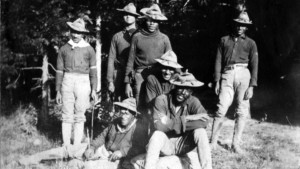 (History.com) Among the earliest stewards of the nation’s national parks were soldiers from segregated black regiments. Starting in the 1890s, the Buffalo Soldiers, who had earned valor fighting in the Indian Wars and Spanish-American War, added park ranger to their titles and played a critical role in protecting and building the infrastructure of the country’s vast public lands.
(History.com) Among the earliest stewards of the nation’s national parks were soldiers from segregated black regiments. Starting in the 1890s, the Buffalo Soldiers, who had earned valor fighting in the Indian Wars and Spanish-American War, added park ranger to their titles and played a critical role in protecting and building the infrastructure of the country’s vast public lands.
The first step toward black soldiers’ peacetime service began after the end of the Civil War in 1865. At this time, the army had discharged more than one million soldiers, reducing the military to 16,000 men. But with a war-torn nation in need of rebuilding and a growing desire to expand into the western frontier, Congress enacted legislation that changed the trajectory of black soldiers in the U.S. Army. (more)
The First Black-Owned Bookstore and the Fight for Freedom
Black abolitionist David Ruggles opened the first Black-owned bookstore in 1834, pointing the way to freedom—in more ways than one.
(Daily JSTOR) The country’s first Black-owned bookstore opened in New York City in 1834, the brainchild of David Ruggles. He was an abolitionist, founder and writer of the anti-slavery newspaper Mirror of Liberty, and one of the early organizers of a network that would become the Underground Railroad. Everything about his work, including his bookstore, was done to support and fight for Black lives.
Born into a free Black family in Connecticut in 1810, Ruggles’s early exposure to the abolitionist movement was through his parents and church. His own interest in the movement strengthened when he moved to New York in 1825, which biographer Graham Russell Gao Hodges notes in his book David Ruggles was generally “unsafe for blacks…. Public discrimination and insulting behavior toward blacks were rampant.” (more)
TIPHC Bookshelf
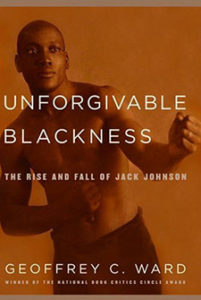 Published scholarship on black history in Texas is growing and we’d like to share with you some suggested readings, both current and past, from some of the preeminent history scholars in Texas and beyond. We invite you to take a look at our bookshelf page – including a featured selection – and check back as the list grows. A different selection will be featured each week. We welcome suggestions and reviews. This week, we offer, “Unforgivable Blackness, The Rise and Fall of Jack Johnson,” by Geoffrey C. Ward.
Published scholarship on black history in Texas is growing and we’d like to share with you some suggested readings, both current and past, from some of the preeminent history scholars in Texas and beyond. We invite you to take a look at our bookshelf page – including a featured selection – and check back as the list grows. A different selection will be featured each week. We welcome suggestions and reviews. This week, we offer, “Unforgivable Blackness, The Rise and Fall of Jack Johnson,” by Geoffrey C. Ward.
In this vivid biography, Geoffrey C. Ward brings back to life the most celebrated — and the most reviled — African American of his age.
Jack Johnson battled his way out of obscurity and poverty in the Jim Crow South to win the title of heavyweight champion of the world. At a time when whites ran everything in America, he took orders from no one and resolved to live as if color did not exist. While most blacks struggled simply to exist, he reveled in his riches and his fame, sleeping with whomever he pleased, to the consternation and anger of much of white America. Because he did so the federal government set out to destroy him, and he was forced to endure prison and seven years of exile. This definitive biography portrays Jack Johnson as he really was–a battler against the bigotry of his era and the embodiment of American individualism.
This Week in Texas Black History
July 20
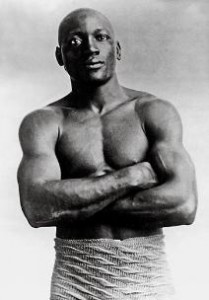
On this day in 1920, Galveston native and former heavyweight champion of the world Jack Johnson was arrested and jailed at Leavenworth Federal Prison in Kansas for violation of the Mann Act, enacted in 1910 to stop human sex trafficking. However, the broad language of the act allowed for it to be used to prosecute men for premarital, extramarital and interracial relationships, even if consensual. The law made it a felony to transport across state lines “any woman or girls for the purpose of prostitution or debauchery, or for any other immoral purpose.” At the time, Johnson was heavyweight champion of the world, but was a target of law enforcement because of his flamboyant lifestyle, specifically his relationships with white women. The Justice Department subsequently brought a case against Johnson with the cooperation of a former girlfriend, Belle Schreiber, and in May 1913 he was convicted by an all-white jury for violation of the Mann Act and sentenced to a year and a day in jail. However, while on bail and appealing the case, Johnson fled the country and fought overseas, including losing the title in a bout against Jess Willard in Havana, Cuba in 1915. Johnson returned to the U.S. in 1920 and surrendered himself for imprisonment. He served nearly a year at Leavenworth.
July 22
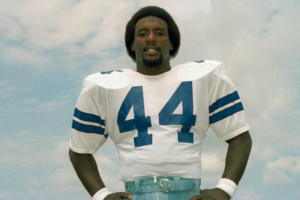
On this day in 2014, Dallas Cowboys‘ great Robert Newhouse passed away from heart disease. Newhouse suffered a stroke in 2010 and had been under treatment at the Mayo Clinic in Rochester, Minn. where he passed away. Newhouse starred at Galilee High School in Hallsville, situated between Longview and Marshall. The University of Houston was the only major school recruiting offer he received and with the Cougars, from 1969-1971, Newhouse set several rushing records and left the school as its all-time single-season rushing leader with 1,757 yards as a senior. That total, at the time, was the second most rushing yards in a season in NCAA history and earned Newhouse second team All-American honors. He was a second round draft pick by the Cowboys in 1972 and played all of his 12 NFL seasons with Dallas. Newhouse led the team in rushing with 930 yards in 1975.
July 22
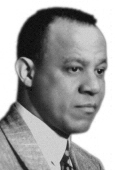
On this day in 1944, Dr. Lawrence Nixon, an El Paso physician, voted in the Democratic primary, the first black voter in the state to do so. The Texas legislature had passed a law in 1923 forbidding blacks from voting in the primary. However, Nixon, working with the NAACP, challenged the law and attempted to vote on July 26, 1924 and was refused a ballot. Twice the U.S. Supreme Court ruled in his favor, however, the state Democratic Party found legal loopholes (including asserting the party was a private organization and could set restrictions on who could vote) to continue preventing blacks from voting in the primary. Finally, as a result of the Court’s ruling in Smith v. Allwright (where Lonnie Smith had brought a similar suit in Harris County), the all-white primary was ended on April 3, 1944 enabling blacks to vote in the primary. The Court ruled that a primary was an election and a political party was an agency of the state and thus could not discriminate by race.
July 25
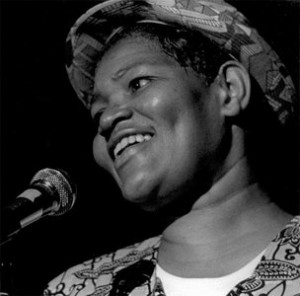
Willie Mae “Big Mama” Thornton, blues singer, died of a heart attack at age 57 on this day in 1984 in a Los Angeles boarding house. Thornton grew up in Montgomery, Ala., but settled in Houston where she started her recording career after being discovered by singer and producer Johnny Otis and working with Houston music mogul Don Robey’s Peacock Records. By the time of Thornton’s death, Otis had become a pastor and in that capacity officiated Thornton’s funeral as many musical artists paid tribute. She was buried in Inglewood Park Cemetery in Los Angeles. Later that year, she was inducted into the Blues Foundation Hall of Fame. Thornton’s 1953 hit, “Hound Dog,” was No. 1 for seven of its 14 weeks on Billboard’s R&B charts. Elvis Presley made it an even bigger hit, and Janis Joplin popularized Thornton’s “Ball and Chain.”
Blog: Ron Goodwin, Ph.D., author, PVAMU history professor
Ron Goodwin is an assistant professor of history at Prairie View A&M University. Even though he was a military “brat,” he still considers San Antonio home. Like his father and brother, Ron joined the U.S. Air Force and while enlisted received his undergraduate degree from Texas Lutheran University in Seguin, Texas. After his honorable discharge, he completed graduate degrees from Texas Southern University. Goodwin’s book, Blacks in Houston, is a pictorial history of Houston’s black community. His most recent book, Remembering the Days of Sorrow, examines the institution of slavery in Texas from the perspective of the New Deal’s Slave Narratives.
Recent Posts
Protect and Serve (Control)
The black community’s relationship with law and order has been tenuous, at best, for generations. Sadly, I believe our society has lost sight of the original purpose of law enforcement and how that purpose has been altered in our current societal and global environments. What’s even worse, if that’s possible, is that some groups in our society still embrace the archaic and erroneous ideology that people of color are genetically inferior to those of… (more)
More Uncomfortable Truths
In February 2020, I was asked to contribute an opinion piece for the PVAMU website. I submitted an essay describing what I called an Uncomfortable Truth of Black History Month. That “truth” focused on the black community’s continual efforts to prove it is worthy of recognition as contributors to American society. Even more so, I argued, it is time the black community finally acknowledges that the subliminal need for acceptance is based on the… (more)
Submissions wanted
Historians, scholars, students, lend us your…writings. Help us produce the most comprehensive documentation ever undertaken for the African American experience in Texas. We encourage you to contribute items about people, places, events, issues, politics/legislation, sports, entertainment, religion, etc., as general entries or essays. Our documentation is wide-ranging and diverse, and you may research and write about the subject of your interest or, to start, please consult our list of suggested biographical entries and see submission guidelines. However, all topics must be approved by TIPHC editors before beginning your research/writing.
We welcome your questions or comments. Please contact Michael Hurd, Director of TIPHC, at mdhurd@pvamu.edu.

